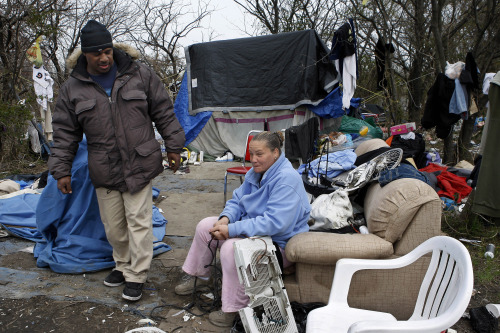CAMDEN, New Jersey (AP) ― The charter bus arrived on a warm day in May a year ago, and when the doors opened, close to 50 people climbed aboard. They brought with them hopes for a better future, in decent homes, free of drugs and crime and all the woes that come from living on the margins.
For days, months or years, they had been living in a ragtag city of tents, tucked away in the woods near Camden’s downtown. Then, Amir Khan, a pastor and entrepreneur, came along and promised them homes for a year.
It was a bold effort to fix a complicated problem in a hurry. Khan figured he could rent homes for this band of homeless people and that with a lot of help and just as much faith, they might flourish.
Not everyone was eager to board the bus. Some disappeared into the urban wilderness in the days before Tent City closed.
For days, months or years, they had been living in a ragtag city of tents, tucked away in the woods near Camden’s downtown. Then, Amir Khan, a pastor and entrepreneur, came along and promised them homes for a year.
It was a bold effort to fix a complicated problem in a hurry. Khan figured he could rent homes for this band of homeless people and that with a lot of help and just as much faith, they might flourish.
Not everyone was eager to board the bus. Some disappeared into the urban wilderness in the days before Tent City closed.

But others embraced the opportunity: the woman whose four children had been taken away from her, because of her depression; the carpenter who was desperate to make a decent life so he could reconnect with his toddler; the ex-convict who never knew a normal life and struggled to stay sober and out of prison.
Fifty-four people in all went with Khan, some first making a stop at a detoxification program.
Television cameras were there to record the end of Tent City; it was a feel-good story.
But a year later, Khan’s experiment has had mixed success. Some of the former homeless have found homes, and happiness, by kicking heroin habits, enrolling in community college. Others’ lives, though, are following the same twists and turns that originally led them to Tent City.
A bus can take you off the street, but it cannot keep you off the street. Life is more complicated than that.
It was Amir Khan’s son, Micah, who got his father interested in Tent City. Local authorities had decided to close the encampment, but deadlines came and went. Micah Kahn visited the site, in the woods next to a highway exit a few blocks from downtown.
He shot video there, and showed it to his father, an entrepreneur who has owned a number of businesses, including an early cell phone company and a bowling alley, and founded the Solid Rock Worship Center, an evangelical church in Camden’s suburbs.
Within a few days, Amir Khan raised money from parishioners and friends to supplement his own. He figured he could house and feed all 54 people for a year for about $250,000.
Their program ― “New Life” ― was invented on the fly. The plan was to get people temporary homes immediately, while using existing outside agencies to provide intensive counseling, drug programs and job training. Beyond that, Khan provided mentors to try to give the clients moral support and guide them to find other help.
New Life would replace a peculiarly thriving community of the homeless. Tent City had a mayor and a set of rules; it operated for about four years.
“You always had somebody to talk to,” says Marvin Tomlinson. “We were a close-knit family.”
For Tomlinson, this was a real home, a place where he had responsibilities like chopping wood and starting the fire for the camp cooks.
Tomlinson bounced for years between Tent City and an inpatient treatment center for people with mental health problems and drug addictions. A wiry 5-foot-2, Tomlinson was perpetually sullen; he robbed and beat people, he says.
Still, it was a relatively stable time in his life.
When Tomlinson was 3, his father killed his mother. Tomlinson himself left school in seventh grade. And when Marvin was a 19-year-old gang member, he fatally stabbed the mother of his newborn daughter.
Tomlinson spent the next 15 years in state prison. When he came out, a hardened man in his mid-30s, he almost immediately developed an addiction to crack cocaine. He stayed with his grandmother for a time before ending up on the streets, becoming one of Tent City’s first inhabitants.
After Tent City shut down, he shared a Spartan apartment in nearby Pennsauken. He was proud to show off his new place. He was figuring out how to stretch his food budget. He sometimes ate dinners out with his two adult daughters, including the daughter of the woman he killed. He found himself smiling.
For the first time in his adult life, he was both free and sober.
He tried to avoid his old friends, knowing he could easily succumb to drugs if he was around them. He says he relapsed once in those first weeks on his own, and immediately regretted getting high. He was letting down Pastor Khan and all the other people who were rooting for him.



![[Herald Interview] 'Amid aging population, Korea to invite more young professionals from overseas'](http://res.heraldm.com/phpwas/restmb_idxmake.php?idx=644&simg=/content/image/2024/04/24/20240424050844_0.jpg&u=20240424200058)















